#Eli Goldsmith
Text
Relationship Pesach - 2024 Israel War - Passover Completion - United Souls Book!
Relationship Pesach – 2020-24 – Passover Completion – United Souls Book!
Dedicated to the real lonely Souls, soldiers & defenders of Yisrael… & Souls Globally – the United Souls that know The Truth of their Souls & for all those that know not yet. A Healthy Spring all 🙂 – With Pesach and Sefirah days already on the way……

View On WordPress
#"The Spiritual Guide to our Husband to make a happy Wifey"#1.The big Guide of souls#A zivug is a life partner#Adar#Alex Clare#Aliya#Amazon.com#Ari Lesser#Artists#Assaf Harush#Baal Shem Tov#Bar Mitzvah#Bless#Blessing#blog#Book Now#Bookings#christianity#Comedians#Connect#Dj Ahava#DJ Hudacris#Dj Keyton#DJ Nayz#DJMikey Mocton#Duvie Shapiro#Eitan Katz#Ekev#Eli Goldsmith#Eli Leibovic
0 notes
Photo
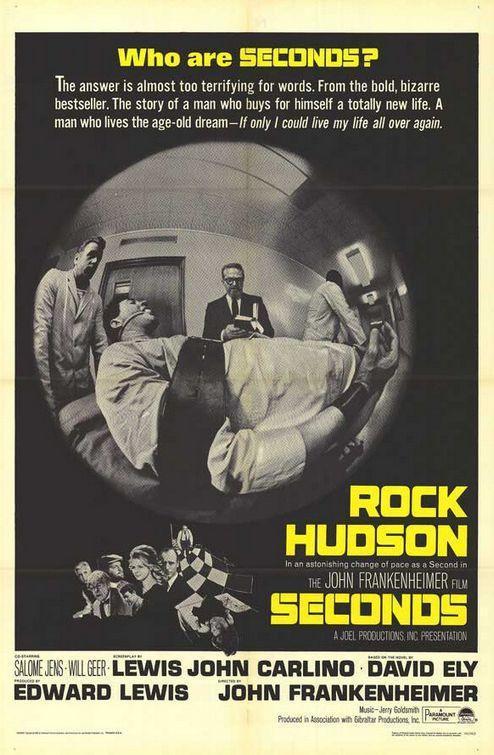
Seconds - John Frankenheimer (1966)
Poster
#seconds#john frankenheimer#cohiba 1966 price#1960s#rock hudson#poster#usa#paramount pictures#thriller#david ely#lewis john carlino#jerry goldsmith#james wong howe#john randolph#salome jens#will greer
60 notes
·
View notes
Text
I listened to Elis James and John Robins on the Comedian’s Comedian podcast, as I somewhat recently passed the point in their radio show when they recorded it. It was a really good episode, even by the standards of that podcast, which are high. Very little messing around with basic explanations of stuff that we could find on their Wikipedia pages anyway, they jump straight in with analysis.
I cut out a few clips as I was listening. I meant to write a paragraph or so about each of them. I am coming back here after finishing the post to say I ended up writing a lot more than that. This one gets out of hand. It mainly stays on the topic of the podcast episode and the radio show, occasionally veers off into some personal stories of my own, makes tenuous connections between the two. That's what's below the cut that I'm adding because not everyone needs to be subjected to that.
I particularly liked this one, from the very beginning:
First of all, Elis James definitely has met another person who will start a radio episode by sighing and just saying whatever's actually in their mind instead of trying for slick broadcasting. Elis knows him very well, the mother of his children is frequently recording lines to put in that other broadcaster's shows. However, there is the key difference that Daniel Kitson's doing that on an obscure radio station (well, two obscure radio stations as he used to do Triple R in Melbourne, but hasn't for a long time, so I mainly mean Resonance FM in London) that doesn't pay him any money, while John Robins is doing it on a commercial radio station that was presumably a significant source of his income and is definitely the main source of his career success. It's definitely more a risk to try in that context.
Anyway, I'd like to put the above clip next to this one:
I'm now three years into following this radio show/listening to various podcasts and other things they've done alongside it, trying to go mostly in chronological order, and I would say they do this in one form or another approximately every six months. Just explicitly state the status dynamic between them, which is that Elis is more successful but John is funnier, this creates a couple of sources of mild tension that can be funny to listen to and give them something to play into as a double act, but it also balances out enough so their entire relationship isn't going to implode like Jon Richardson and Russell Howard. It's always a bit weird when they actually say that out loud, comedians aren't really supposed to tell us what level of status they've decided to assign themselves/each other for any given moment.
Elis James frequently says John Robins is a better comedian than him, which also a bit weird because it's the sort of thing you'd say as a joke, but he never sounds like he's joking, and it's... I mean, I was going to say it's objectively true, I guess it can't be given how subjective comedy is, but it is pretty clear cut. And it seems to genuinely not bother Elis James, which I used to think was odd, but I guess it makes sense. I've been teammates with people whom I know are better athletes than me, and we can still be friends, and if anyone asks who's better I can be honest about that. It sure would make that easier if I also somehow won more medals than they did (to continue the somewhat stretched analogy of Elis James having more TV work so that balances the scales), though sports tend to be more of a meritocracy than arts so that doesn't really happen.
There's also truth in the thing John said about how one of them has to come up with content for the radio show - they're on the same official footing, co-hosts rather than calling anyone a sidekick or whatever, but the vast majority of the funniest stuff gets said by John, and more than that, John drives most of the discussions. He usually comes in with more features and stuff prepared, he establishes a lot of the running jokes and keeps them going, he's the one who will lead most of their offshoots into weird little sketches and characters. His timing is incredible sometimes, every once in a while he'll have an episode where he's got Lee Mack levels of being able to jump on everything that gets said almost immediately and be funny every time. He seems like he can decide, pretty much based on how he's feeling at the moment but possibly also based on a sense for how much potential something has, whether to wrap up a thread in one incisive sentence or to draw it out. And it's almost always John making that decision (if it isn't the producer telling them to get on with it, that is, but it's rarely Elis' decision). Sometimes I can hear John work out the comedic potential in something they're talking about before Elis does, and Elis will start to move on but John will bring it back and guide him toward it, and eventually manage to push Elis into whatever joke John had figure out would be funny but only if Elis said it.
Having said that, and this is a tangent but discussing whether Elis James is funny just made me think of it, I've been wanting to give him credit for something. At some episode sometime in 2016, Elis James was telling a story about someone he admired, and the story was about something fairly serious, and at the end of it, John asked "Is he a laugh?", which was quite a funny thing to say in the context, it's annoying me that I can't remember the exact story but it was something like that. And it was funny to hear John be so efficiently dismissive of the sort of weird story. But later in the episode, John told one of his stories about one of those vaguely depressing things he does, like obsessively do his taxes four months in advance or drink rum alone at 2 AM and get sad while watching Queen documentaries - one of those types of stories - and at the end of it, Elis asked "Are you a laugh?" And after that, for several months, Elis James brought that back the exactly perfect number of times. I don't know how he did it, how he got it so perfect every time. He didn't drop it for long enough for regular listeners to forget that he'd made this a running joke, so it would lose its power as a callback. But he didn't say it often enough for it to start to get overused and less funny (not that those guys would ever try to milk more from one bit than it should be expected to bear... but of course we're all on email). There is such a small sweet spot, such little room for error in the frequency with which you can bring back a joke and not fall into either of those traps, and he got it perfect every time. Every time he'd said it, I'd have a moment of surprise because he'd left it just barely past the point at which it had been long enough since I'd heard it for it to get really funny again, and every time, I'd take a moment to admire his timing. He kept it going for quite a while, occasionally responding to John's depressing anecdotes from his own life with "Are you a laugh?" So, well done to Elis James, he can be funny too. Also, I mean, obviously he is regularly quite funny on the radio show, just not as funny as John Robins. It's fine, most people aren't as funny as John Robins. I'm not as good at underhook setups as my friend I hung out with the other night, but it's fine, we manage to get on with our lives.
Anyway, that was only very tenuously related to the topic of this post, let me see if I can find my way back. John Robins and Elis James having an odd balance of tensions created by John being funnier but Elis being more successful. I'm not sure that's as true now as it was in early 2014 to early 2017, which covers the period of radio episodes I've heard so far. At that time, Elis had recently had major roles in two sitcoms (Crims and Josh). He'd had one Welsh-language stand-up special released on the BBC and I think was working on recording another one. He'd done some panel show spots, more than John I think. I think he's started on his BBC television travel show with Miles Jupp. He'd gone to Europe to do TV and radio things about the Welsh football team. John Robins, meanwhile, had released the audio from a couple of his stand-up shows himself on Bandcamp, had been on Mock the Week twice and one of those times was a fucking disaster, a couple appearances on As Yet Untitled, and I think he occasionally got on things like The News Quiz but less often than Elis James did. I think he had a pretty good stand-up career going by then, but it hadn't really translated to other stuff. And John complained at times that he didn't get as many reviews and publicity as his stand-up profile deserved, though it's hard to tell if that's true or just his bias. He had a job for a while doing TV warm-up gigs, but then he got fired for what sounds like a combination of drinking too much and being too harsh for the "keep it light" atmosphere. The disparity between his profile and Elis' was probably for two main reasons: 1) Elis has the significant USP of being one of the only comedians who's fluent in the Welsh language so that gets him some stuff, and 2) the reasons outlined in that second audio clip about John having pissed everyone off.
I think their positions are different these days, though. I'm into the March 2017 episodes right now, in a few months John Robins is going to win a Perrier Award, so he can't keep complaining about not having a significant enough stand-up profile after that. That turned into a Netflix special, a significantly bigger deal than Elis' Welsh-language BBC iPlayer special. And then in 2018 he hosts a panel show, which I have downloaded but haven't watched yet, I'll wait until I get there chronologically. To be honest I'm slightly dreading getting there because I have a feeling it might be terrible. I don't think it was hugely successful because I'd never heard of it before I started looking up John Robins things this year, and I went really deep down the panel show rabbit hole in the last few years, I watched some quite obscure ones but never came across this. It also only lasted one season. But still, he hosted a panel show on Dave. That's a TV career.
And now, obviously, he's on Taskmaster. And seems to be playing large rooms in his latest stand-up tour. A tour that I'd assumed would get filmed for another TV special, though he's mentioned recently that he's planning to put it on Bandcamp like his earlier shows, and I do appreciate him keeping it real for us despite now being a Taskmaster star with a huge tour (as much as this shouldn't make sense because there can be visual humour in stand-up, I tend to prefer audio-only stand-up that's usually closer to how it actually sounded in the room, over filmed versions that get more edits). On the other hand, Elis had a TV series about Welsh comedy a few years ago. A podcast with some football players. I've just looked it up and apparently he hosts a football-based TV show on Sky, so that's nice. But the gap in TV-based success has probably closed.
But that discussion they had in that second audio clip - about John Robins not getting stuff because he's (rightly and justifiably) reaping the consequences of being a dick with a substance abuse problem, and Elis James valiantly taking on the role of Robins Apologist - that really nails, for me, what I enjoy so much about their dynamic. I think that my favourite dynamic. I fucking love anywhere where two people get that one going. That dynamic that's summed up by this post htat I remember from ages ago and have somehow just managed to find because Tumblr's terrible search function decided to work for me today:

It was about a year ago that I had the extremely clever idea of adding that Taskmaster screenshot to that other person's text post, but I maintain that it's hilarious. Guy Montgomery and David Correos were so much fun because of this. At the time, I considered instead using a screenshot from Taskmaster UK season 5, with the speech bubble pointing at Mark Watson looking at Nish Kumar. There are so many example of two people whose comedy show interactions have been hilarious because they're based on one person making terrible decisions and the other person looking at them like "I'd follow him to hell and back but I wish he'd just stop going there." And not always a him, it doesn't have to be a him! Danielle Ward and Margaret Cabourn-Smith had some good "I'd follow her to hell and back but I wish she'd just stop going there" energy on Do the Right Thing (with Danielle Ward, of course, in the Correos/Kumar/Robins position).
I'm sure I realized until right now, as I write this, how much this might be my favourite dynamic in comedy because it also characterizes my favourite relationships in my own life. And I am genuinely not sure whether that's a me thing or whether most people can slot most of their relationships into one where someone's the David and someone's the Guy, in terms of who keeps driving things to hell and who follows out of loyalty but also apologizes. When I was in high school, and also for most of my twenties, my nickname among my friends was "loose cannon" because when they were trying to be careful and diplomatic in the political battles within the increasingly high levels that we reached in the sporting world, I was the person who once yelled at my coach in a hallway because I was so angry at the way he treated the athletes, and had a letter in my coaching file by age 22 that accused me of not caring about common courtesy. A letter from a coach who refused to work with me anymore because I was insufficiently courteous, so my best friend had to liaise with him on everything while asking me to please not upset more people and further alienate our team. And I have wonderful friends who tell other people that I don't hate them, really, I just seem standoffish because I'm shy, and later on they tell me that I really need to work on my poker face/ability to be around people I hate without making it incredibly obvious that I hate them. In addition to being genuinely shy. When we tried to get someone from my team elected to the provincial board, we knew from the beginning that 1) I would do all the actual work for both the election campaign and, if successful, the role itself, because I know and care the most about the issues and am good at admin stuff, and 2) I could not be the candidate because I hate most people and everyone I hate knows I hate them because I have no diplomacy skills.
Though I do also have one friend who coaches a team in another city and he knows he can call me pretty much any time and ask me for pretty much any favour and I will do it, and I will edit his emails and do his research for him to help him fight his stupid pointless battles and to try to keep him on top of things even though he can't keep track of anything and keeps making wild badly planned decisions, and people ask me why I don't just let him fail and walk away, and I say I know he seems like a brash asshole with no ability to think ahead, but he's a really good guy, really, once you get to know him. It's got back to me that most people in our sports community assume I am or was sleeping with him, as that seems like the only explanation for why I would stick by a guy who's clearly an idiot. The truth is much weirder, he was my university teammate in 2013 and one time he was in my corner when I had a panic attack in the middle of a match at the university national championships, and he saved me and got me through it and I managed to go back and win, and that's why I had to do things like sleep on a hotel room floor for a week in Atlantic City because he'd talked me into going on a provincial team trip where he hadn't booked enough rooms (or planned anything), because he'd earned my eternal loyalty. Oh God, I just remembered how during that trip he stopped to gamble in front of children, and I ended up yelling at him in the middle of the street in Atlantic City, "You know, I argue with people about you!" And he said, "What people?" And I said "People who think you're not responsible enough to run a provincial team trip! Which is everyone! I get into big arguments with them and you make it hard when you do shit like this!" But a few years later he was the first person I called when our mutual friend died because I realized in that moment, that's the person I trust most in the world.
Anyway. What was I talking about? Elis James and John Robins. I think I was talking about Elis James and John Robins. Okay, turns out listening to people talk about the friendships that you base on blind loyalty and apologism brought some stuff up for me. I think I have, in recent weeks, at times blamed my overly emotional posting - my posts that start out as comedy analysis but then go into oversharing about my person life - on the fact that I'm going through some emotionally difficult stuff as I'm trying to avoid drinking. But that's not the case here, I think I was always going to go on that tangent. I haven't seen my friend from out of town in a while, I'm a bit worried about him. I think he might be ruining his own life again. Something was going to connect to that. Rhod Gilbert reminds me of him.
Anyway. Anyway. Elis James and John Robins. Solid double act dynamic. Weird balance of status and tensions, enjoyable running thread of loyalty and apologism. Amazingly, I'm not done, here's another clip I cut out of that ComCom interview:
This is the second time I've heard John Robins tell this story, and I had the same reaction as the first time, which was: Oh my God oh my God oh my God, how were you ever able to sleep again? The horrible sharp pain of this story keeps me awake at night, just imagining what it would be like if that happened to me, and it didn't even happen to me. How could you ever sleep if it did? John Robins frequently tells stories from what he calls the "shame well", those things that happen where you obsess over how you did something wrong and regret it. John is constantly making jokes (or just statements) about how he lives a life mired in shame and regret. But still, I don't see how he can just casually throw this one out there like it's just another shame well story. It's so much worse. It's the worst one I've heard. I would hide under my bed for the rest of my life.
John Robins went on Adam Buxton's podcast in 2016, I have listened to that episode and it's not great. You want to talk about dynamics created by a differential in status - I think that one went way too far, to the point where nothing could really happen. There was this huge discrepancy of John Robins meeting his hero, which will often make someone sort of adorably giddy but not in this case, he just seemed a bit out of it and subdued. While on the other side, Adam Buxton appeared to have no idea who John Robins was, so not much discussion got generated. It wasn't a complete disaster, but I could understand why John didn't plug that one on his radio show, despite plugging most of his podcast appearances.
Anyway though, if I can manage to get past the sheer horror of the first part of that clip, the second part was sort of nicely validating. Because I am slightly weary of how much my trip down the Elis and John rabbit hole has got quite intense quite quickly, even by my standards of comedy obsession, and possibly taken a turn for the parasocial. I mean, I am currently writing a multi-page post about an interview they gave and it includes several paragraphs about my own life that are only tenuously related, in a way that I can say "Look I do the same thing as these guys I've never met."
The intensity of that has definitely been accelerated by the fact that I happened to, by a genuine coincidence, get into this show at the same time as I decided to try to slow down and/or stop drinking, and God, a lot of the ways in which John Robins talks about alcohol and anxiety resonates. And yep, I'd feel weird admitting it because I know it's sort of inherently creepy to say "they feel like my friends" about some people you've never met, but since John Robins said it first I think I can admit those headphones do make a difference. Might be another reason why I prefer the Bandcamp comedy to a Netflix special.
They touch on this throughout the ComCom interview - not so much in the clips I cut out but throughout the whole thing, it really is worth a listen if you're interested in this - the way their radio show gets so many letters from people who thank them for talking so honestly about mental health issues, people who say they've dealt with their own difficult shit and find this radio show has helped. Probably lots of shows get similar letters, but I think it's safe to say this one gets more than most. The Bugle used to read out their correspondence and Andy Zaltzman wasn't getting people every day saying "Thank you for making me feel less alone in my depression."
They really are good at that, at hitting the exact right balance of honest without being overbearing about it. For a show that spends so much time talking about symptoms of mental health problems, they almost never use the words "mental health". They never sit down and say "let's have a talk about what it's like to live with anxiety." They just describe their week, in more honest detail than you would normally hear on commercial radio. And leave in the parts where they panic about every decision they've ever made and get drunk alone in the middle of the night and cry because they think they've done everything wrong. And by "they", I mostly mean John.
I do like their word, "darkness". I didn't realize, when I first watched The Darkness of Robins in 2022 (a show John first performed in 2017, won a large award for it, released as a Netflix special in 2018, but I watched it in 2022), that that title's been around for ages. Elis James made a joke in an early radio episode, from 2014, about how someday, John should do a show called The Darkness of Robins, where he just lays bare all his anxieties, all his weird toxic quirks and control freak tendencies and oceans of shame and regret and various addictions/self-medication and cynicism and bitterness and anger and deep self-loathing. Elis said this as a joke, the joke being that you can't just put all that in a comedy show. But they kept the joke going for years. John did the Richard Herring podcast, in which he talked a bit about some of the more difficult mental health struggles he's had, and when he plugged it on the radio show, instead of saying "I talk about some of my more difficult mental health struggles", he said, "There's a fair bit of the darkness of Robins in it." And then he started casually referencing it on the show, describing a night when he might have drank too much and had a panic attack with a causal and sort of joke-y "I got overcome by the darkness for a little while." And then they started describing those emails from listeners who say it resonated with "[Person] has emailed in to say they've been afflicted by a touch of the darkness, sorry to hear that." And I just love that word. It's used with enough genuineness to make it clear that they're not making fun of mental health problems, they really do have them and it does feel dark. But also with enough irony - obviously there is irony in using a term as grandiose as "The Darkness of Robins" to describe panicking at 3 AM about something bad you said in school - to make it feel like it's not an after school special. I also like that they found a way to let that word mean no one has to name a diagnosis, to narrow their issue down to a loaded term like "I suffer from clinical depression", when not everyone who has that is diagnosed, not everyone is comfortable naming it, not everyone finds it easy to separate their symptoms into clear-cut causes. They can just use a shorthand like "the darkness".
It has been good, to have this radio show for the last couple of months that have brought some darkness into particularly sharp focus, as I decided to quickly remove the maladaptive self-medication. I've tried to stop writing about it so often the way I did earlier in the year, but as a little update on how that's going, still bad. Not enjoying it. Getting mildly parasocial about some guys on the radio might not be hugely healthy, but it's a healthier coping mechanism than whiskey, I guess. I'd really like some whiskey. Anyway I'm fine.
I do think that's why I find that Adam and Joe story so incredibly painful, though. I get paranoid about whether I get too parasocial about the comedians I like, I try really hard to be self-aware about it and be super clear that I know what I'm getting is a curated public persona and I do not actually know these people, and I am mortified at the thought of being one of those fans who thinks they actually are my friends and therefore they should know something about me. No one should know me. I hang out on Tumblr because it's the one social media platform where I know no famous people are searching their own name or anything, everyone's just an anonymous nerd. The thought of anyone knowing me makes me want to hide under my bed for the rest of my life. Though having said that, John Robins and Elis James are always very nice about people who write in with darkness emails.
Amazingly, I'm still not done this post:
Throwing this in just to say, once again, that I'm sorry for having also thought this but in my defense it's not just me. I am truly sorry that when I first heard John Robins got sober, my first thought was... but he's still going to be bitter and angry and annoying and plagued by regret and self-loathing, right? Because that's kind of the cornerstone of his comedy and is what I love so much about it. I mean obviously I want him to be happy, but could he release a couple more stand-up hours first?
I feel genuinely guilty for having thought that, especially because I do hold the sort of political belief that it's bullshit to say one must suffer to make great art, van Gogh did his best work once his mental illness was being treated, and all that. I do believe it applies to more contemporary things too. Jason Isbell made his best music after getting sober. I think James Acaster's best stand-up show might be his current ones, and it's a "let me tell you how therapy has made me healthier" show. But John Robins did base a lot of his comedy on being bitter and angry and annoying and plagued by regret and self-loathing. That's sort of my favourite thing about it.
I felt slightly better when I re-listened to his 2014 show (recorded in 2015) This Tornado Loves You, and was reminded that he admitted that himself:
That's John Robins talking about how his comedy has suffered because he's too happy in his relationship with Sara Pascoe, a relationship that has ended a 20-year search for happiness. And it goes with the clip I posted before that from the ComCom episode, of Elis James saying it's nice that John's relationship with Sara Pascoe recently ended, because it's given the quality of his comedy a real boost. And maybe they should just ruin John's life regularly to keep it that way. So it's not just me who had that horrible thought.
I'm feeling the need to clarify, once again, that of course I don't genuinely think that's a good thing. Obviously it's good that he got sober, for his sake but also, reports suggest his latest show Howl is excellent. I think Howl was written partly while he was drinking and partly while he wasn't, but performed after he'd quit, and the fact that it's done so well suggests that people can, in fact, make their best stuff after getting their shit together (I haven't actually heard the show, he's said he'll release it on Bandcamp sometime soon-ish, probably). And even if his comedy did get worse, which it clearly hasn't, it would still be best that he quit drinking because suffering wouldn't be worth great art, even if it were required for it. That's how it works. Drinking is bad for you. I definitely don't want to drink any whiskey right now. It's fine.
But. But. I recently re-listened to John Robins' episode of Isy Suttie's podcast, The Things We Do For Love. This is a rare instance that I've heard of a comedian being genuinely drunk while recording something. It's happened before that comedians will claim to be a bit loose and tipsy, but not usually so drunk that they're slurring their words. John Robins on Isy Suttie's podcast was slurring his words. He kept losing track of the question and interrupting at inappropriate moments. It's one of those things that makes me say "Oh, yeah, you really needed to quit drinking. This really was affecting your career, that's just a guy who showed up to work too drunk to effectively do his job."
But it was really funny. It made me laugh so many times. At one point he gets furious because Isy Suttie asked him whether he knows how to drive a car. Later on he threatens to murder her and Elis for their sitcom money, which would have been an okay joke but tbere was a bit of a sense of line crossing when he also threatened their child. (Fun side note that has nothing to do with John being drunk: at one point Isy tells a story about her ex-boyfriend, John Robins asks what the ex's name is but she refuses to say, which is weird because I know. It's weird that I know something about Isy Suttie that John Robins didn't, at least on that day.) It's a mess. It's hilarious. I feel vaguely guilty for finding that so funny, the same way I do about the episodes of No More Jockeys where Mark Watson gets properly drunk - that guy's probably got a problem too, I probably shouldn't laugh at it so much, but I also find those the funniest episodes. I have the say, the episode of Adam Buxton's podcast where John Robins was sort of awkwardly reserved would probably have been funnier if John had gotten drunk before it.
My best defense for that is I would not want John Robins to actually be drunk when he performs stand-up, or certainly when he writes it. Being drunk made him funnier on a podcast interview where he's supposed to tell off-the-cuff stories, because off-the-cuff stories get better when someone's filter has been broken down. But also, in his actual stand-up, or even his actual radio broadcasting, John Robins is doing a thousand little things at once to make what he's saying funnier. He's the master of the well-timed pause and the carefully chosen word. None of that would be any good drunk. So I maintain that you don't need to suffer addiction to make great art. It might help a bit to make funny tangents on an interview podcast, but not the actual substance. Also, however funny I found it, I don't think he was proud of that one. On the radio show, John plugged his appearance on Isy Suttie's podcast before he did it, but not one word about it on the radio after it had been recorded, even though most of those things he'll plug both before and once they're released. Though in a later episode of her podcast, Isy mentioned that the first guest she'd had on was a very drunk John Robins, who called her the next day desperately asking her to cut out the sexually explicit story he'd told using an old girlfriend's real name.
And she did cut it out, it's not in the podcast, as it shouldn't be, because it's not responsible to tell sexually explicit stories in something that's being recorded and will be published, if the audience knows the real name of the person you're talking about. Having said that, I've finally reached the point in the radio show where John's doing WIPs of The Darkness of Robins, where he does just that about Sara Pascoe, and I'm having a bit of trouble morally justifying how much I like the show in spite of that. I think I'll re-watch that show tomorrow, for the first time in nearly a year and a half. I'll see how that goes. I remember it as being very, very good. But also, in the last few weeks, I've had three different people watch it because of my posts about John Robins, and all of them came back to me to point out that the stories about Sara Pascoe are pretty inappropriate to tell on stage. I'm still holding out hope that I'll hear him clarify on the radio show that he did run that stuff by her before saying it publicly, or at least before recording it for Netflix.
Anyway, this post got a bit out of hand. I've tried for the last couple of weeks to slow down on my posting about the Elis/John radio show, and the posting about my personal life, but I seemed to have built up a lot to say and put it all in this one. I'm doing fine.
6 notes
·
View notes
Photo
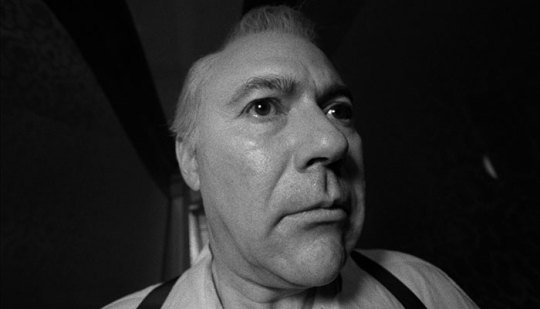


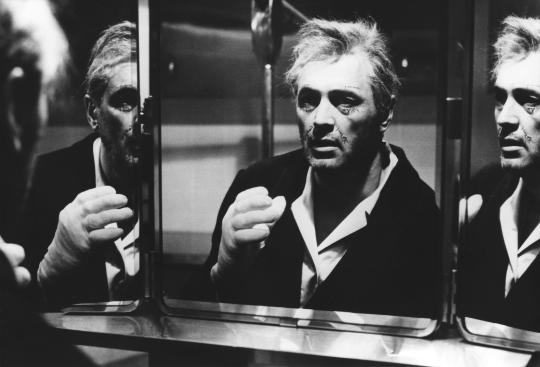



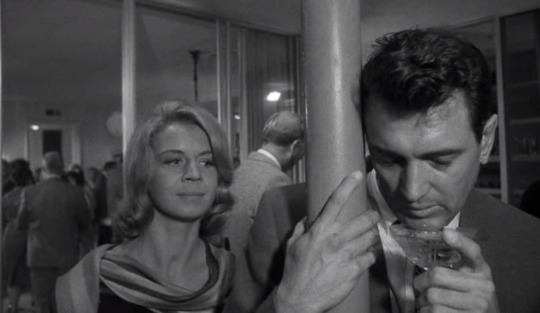


Seconds (John Frankenheimer, 1966). Cast: Rock Hudson, Salome Jens, John Randolph, Frances Reid, Murray Hamilton, Will Geer, Richard Anderson, Wesley Addy, Khigh Dheigh. Screenplay: Lewis John Carlino, based on a novel by David Ely. Cinematography: James Wong Howe. Art direction: Ted Haworth. Film editing: David Newhouse, Ferris Webster. Music: Jerry Goldsmith.
4 notes
·
View notes
Text
Dünyanın belirli bir yerine gitmeyi aptalca mutluluk sayan ve oralara gidememeyi felaketlerin en büyüğü olarak gören Ovidius, Cicero ya da Rabutin’in bahtsızlıklarından ve karşılaştıkları zorluklardan yakınmalarını okurken nasıl içerlerim, bilemezsiniz. Onların sıkıntıları, büyük güçlükler yaşayan yoksulların pek çoğunun bütün bunlara her gün hiç sızlanmadan katlanmalarıyla kıyaslandığında, olsa olsa bir zevk olarak görülebilir. Yiyorlar, içiyorlar ve yatıp uyuyorlardı; kendilerine bakacak köleleri vardı ve geçim sıkıntısı çekmiyorlardı; oysa pek çok insan kendilerine destek olacak ya da yardım eli uzatacak bir dosttan, dahası kışın soğuğundan korunacak bir barınaktan bile yoksun yaşayıp gider.
Harp Malulü / Oliver Goldsmith
2 notes
·
View notes
Text
Happy Purim from Unity Bookings & Unity Marketing - Updated Unity Projects Site!
United Souls by Eli Goldsmith – a Nourished Soul, Shabbat Shalom, Intimacy Beyond & The Synergistic Journey Together!
Dedicated to the real lonely Souls, soldiers & defenders of Yisrael… & Souls Globally – the United Souls that know The Truth of their Souls & for all those that know not yet. A Healthy End to Winter all 🙂 – With Spring already on the way…
🚀✨ Exciting News! Our Home Page Just Got…
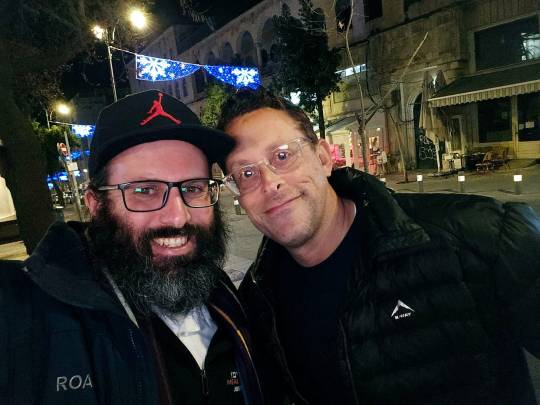
View On WordPress
#"Believers"#&039;Parnasa&039;#Adar#Alex Clare#Aliya#Bereshit#Bless#Blessing#Brooklyn#charity#Charles Sakkal#Chatzot#Chazal#Chumush#Connect#Contribute!#DafYomi#Efrat#emuna#Emunah#Esther#Event Merch#Faith#family#finding preferred LANGUAGE#Gaza#go#Gratitude#happy#Harvey Goldsmith
0 notes
Photo

1 day away!!! @TheLightofInfinite Festival is back! Join us this Tuesday, September 20th as we bring back the first of its kind Torah/Kabbalah/Mindfulness Festival featuring some of your favorite souls! & it’s FREE with an RSVP! This second LOI festival celebrates Erez Safar's book release, "Light of the Infinite: The Genesis of Light," which just hits stores, get your copy now as Prime on @Amazon!! The dream line-up of epic souls includes Akiva Tatz, Ari Lesser, Chaya Lester, Eliyahu Pereira (Two Chassid's in a Pod), Moish Feiglin, Akiva Gersh, Moshe Gersht, Shaindel Deutsch, Rabbi Peretz, Erez Safar, Adam Weinberg, Eli Goldsmith, Raquel Kirszenbaum, Barak Hullman, Ariel & Sarah Perets, Nellie Hayat, Rephael Perkel, Ricki Silber, Judah Fire, Eitan & Shira Ben Avraham, Gabriella Bodner, Eliyahu Beda, Yoseph Leib, Rabbi Josh Zebberman, Natanel Dukan, Elizabeth Bast & Chor Boogie, Rav Aaron Leibowitz, Charles Goldberg, Grace Friedman, Malkah Geller, Rabbi Shmuel Reichman, Yehezkel Yosef Abulafia, & more! About the festival: "The Light of Infinite Festival is a first of its kind live-stream festival featuring authors, speakers, healers, musicians and some of the most innovative minds in spiritual self-growth and healing. The Festival boasts two interactive rooms on an exclusive virtual platform allowing festival goers to jump from room to room attending live talks, sessions, and musical performances. The last festival took place in May and was a huge success, with over 12,000 spiritual and self-growth seekers tuning in to the variety of sessions. Produced by Erez '@diwon' Safar, who acts as Your Spiritual DJ, and whose first live-stream festival, Lo-Freq Fest, was featured in Billboard, and whose Don’t Block Your Blessings festivals featured over 100+ world-wide presenters with 45,000+ attendees/ viewers. The goal of the Light of Infinite Festival is to foster creative and collaborative bridge-building while presenting thought leaders through light and love to a world in need of healing." FREE WITH RSVP @ www.lightofinfinite.com/fest 🪬🤍🕊 https://www.instagram.com/p/CitcAJoLOJL/?igshid=NGJjMDIxMWI=
0 notes
Photo
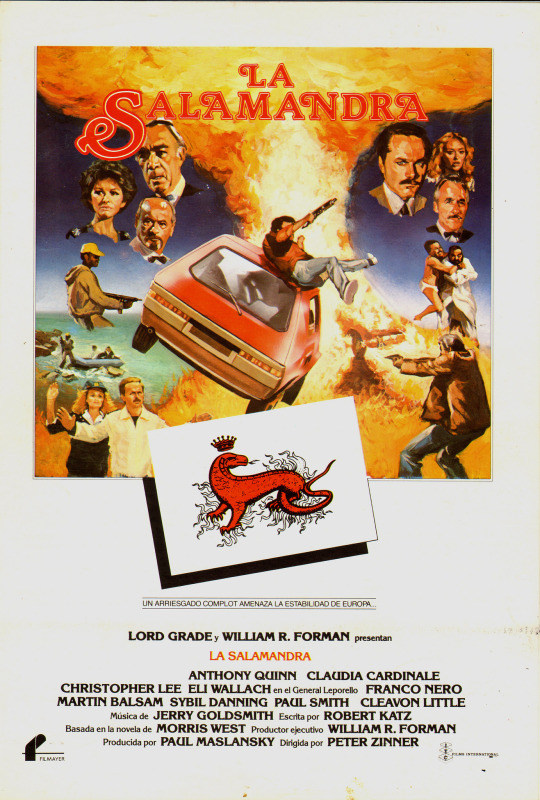

CALIFICACIÓN PERSONAL: 5 / 10
Título Original: The Salamander
Año: 1981
Duración: 103 min
País: Estados Unidos
Director: Peter Zinner
Guion: Robert Katz
Música: Jerry Goldsmith
Fotografía: Marcello Gatti
Reparto: Franco Nero, Anthony Quinn, Christopher Lee, Claudia Cardinale, Martin Balsam, Sybil Danning, Cleavon Little, Paul Smith, John Steiner, Eli Wallach, Renzo Palmer, Anita Strindberg, Marino Masé, Fortunato Arena
Productora: Coproducción Estados Unidos-Italia-Reino Unido; ITC, Opera Film Produzione, Orbi S.A
Género: Thriller
https://www.imdb.com/title/tt0083024/
TRAILER:
youtube
2 notes
·
View notes
Text

I posted 4,433 times in 2021
82 posts created (2%)
4351 posts reblogged (98%)
For every post I created, I reblogged 53.1 posts.
I added 2,797 tags in 2021
#i laughed - 578 posts
#mentally i'm 13 - 577 posts
#surf - 267 posts
#surfing - 267 posts
#movie geek - 242 posts
#longboards - 211 posts
#on the magic queue bus - 181 posts
#dog dog dog - 167 posts
#i can find no fault in this logic - 161 posts
#food porn - 146 posts
Longest Tag: 96 characters
#tell me you haven't read the new testament without telling me you haven't read the new testament
My Top Posts in 2021
#5
The opposite of war isn't peace.. It's creation
Jonathan Larson
13 notes • Posted 2021-06-18 03:24:35 GMT
#4
youtube
Finally got a chance to watch CNN’s Apollo 11: Quarantine and wow is it good!! One big thing I had forgotten (I was 5!) was the bio-hazard suits they to put on. @kaiyves and any other Capsule Heads out there, well worth your time.
16 notes • Posted 2021-03-08 02:31:03 GMT
#3

Everyone says they’re lucky to have met their partner, and that’s undoubtedly true for me. As for me? The number of things that had to fall into place, even in some cases, not wanting to do something (I didn’t want to move to Splash, and there’s no way we would have met otherwise), are just staggering to me.
30 years ago today I was lucky enough to marry my best friend, my biggest supporter, my confidante, and the love of my life, the Lovely & Talented @kjuw89
16 notes • Posted 2021-01-12 01:00:54 GMT
#2
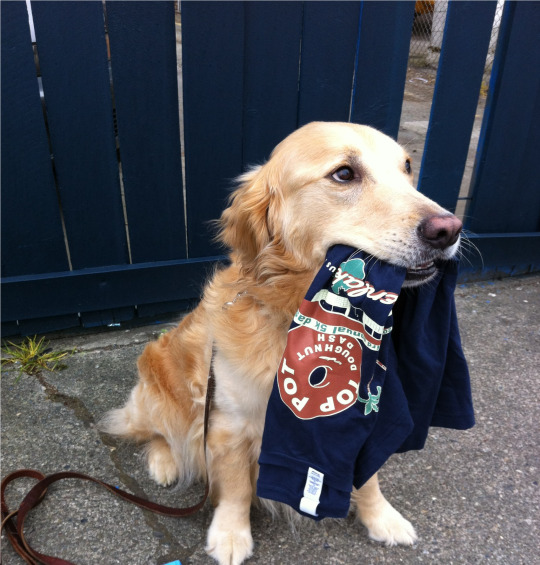
We were introduced to Willie by our friends at Evergreen Golden Retriever Rescue. It seems that he had "nipped" at someone and his former owner was told that he was "too aggressive and should be put down". Thankfully they chose a different path and turned him over to EGRR. It's true that in the beginning he was just a tad aggressive, but never dangerously so, and our best guess is that he was the Alpha in his old pack, but he quickly learned his place in our pack he was just fine. Once he figured out that, he was all bark till we told him it was okay and then he'd try to bring you a toy.
Will was never much on the whole Golden Retrieving thing, but he was outstanding at being a Golden Carrier. Water bottles, branches, and after we moved down here the occasional palm frond, if it could fit in his mouth he'd want to carry it (one of our neighbors used to leave out a stick for him with a note that it was Willie's stick and no one else's). Will became a fixture at 5k runs in the Seattle area, always carrying the event t-shirt or a bandana around the start line and out on the course, I seriously have no idea how many people have pictures of Will on their phones but we were always being asked by other if they could take a photo.
In October of 2017 he made the migration to San Diego with us and instantly became a San Diego Dog. The Lovely & Talented worked from home full time which meant he had the run of the place, and with the nice weather he found places to sun himself as well as places keep cool when the occasion called for it.
We had to say goodbye to him today, but as with Eli, Ollie, and Toby, he'll be in our hearts forever. Fair winds and following seas Willie the Wonderdog, you will be missed.
GoldSmith's Where It All Started "Willie" 03 Dec 1998 - 16 Feb 2021
21 notes • Posted 2021-02-17 01:16:50 GMT
#1

The swing that broke the record. Quite possibly the greatest power hitter of all time, but certainly the greatest of that era.
“Hammering” Hank Aaron - 05 Feb 1934 - 22 Jan 2021
270 notes • Posted 2021-01-22 15:59:31 GMT
Get your Tumblr 2021 Year in Review →
3 notes
·
View notes
Photo

LUCIAN MICHAEL FREUD
On this day of 8th December, Lucian Michael Freud, (8 December 1922 – 20 July 2011) the grandson of Sigmund Freud, was born in Berlin, Germany.
His family moved to England in 1933 to escape the rise of Nazism.
He was a painter and draughtsman, specialising in figurative art, and is known as one of the foremost 20th-century portraitists.
His early career as a painter was influenced by surrealism, but later his often stark and alienated paintings tended towards realism, and his paintings, spanning over a 60-year career, are mostly of friends and family. They are generally sombre and thickly impastoed, often set in unsettling interiors and urban landscapes. The works are noted for their psychological penetration and often discomforting examination of the relationship between artist and model.
Freud studied at the Central School of Art in London, and at Cedric Morris' East Anglian School of Painting and Drawing in Dedham, and at Goldsmiths' College, at the University of London,
Poet and editor Meary James Thurairajah Tambimuttu commissioned the young Lucian to illustrate a book of poems by Nicholas Moore entitled The Glass Tower, which comprised, among other drawings, a stuffed zebra and a palm tree which reappeared in The Painter's Room.
Freud was a member of figurative artists as a group named the "School of London". Major figures in the group included Kitaj, Francis Bacon, Frank Auerbach, Michael Andrews, Leon Kossoff, Robert Colquhoun, Robert MacBryde, and Reginald Gray. Freud was a visiting tutor at the Slade School of Fine Art of University College London.
Freud's early paintings are often associated with German Expressionism and Surrealism in depicting people, plants, and animals in unusual juxtapositions as in Cedric Morris, but later he developed a thinly painted very precise linear style with muted colours, like his self-portrait Man with Thistle, Girl with a Kitten, painted with tiny sable brushes and evoke Early Netherlandish painting.
By the middle of the decade, he developed a freestyle using large hog's-hair brushes, concentrating on the texture and colour of flesh, and much thicker paint, including impasto as in Girl with a White Dog,
By about 1960, Freud had established the style that he would use, for the rest of his career which were of portraits often used an over life-size scale, but relatively small heads or in half-lengths.
He often features a pet and its owner. Examples are in Guy and Speck, Eli and David, and Double Portrait. His portraits of horses include Grey Gelding, Skewbald Mare, and Mare Eating Hay.
Freud spent 4,000 hours on a series of paintings of his mother,
Freud painted artists, Frank Auerbach, Francis Bacon Leigh Bowery, Henrietta Moraes,
The portrait titled Benefits Supervisor Sleeping was auctioned for $33.6 million,
He was exhibited at the Abbot Hall Art Gallery, the Scottish National Gallery of Modern Art, the Museum für Moderne Kunst, Museo Correr, Venice, and Museum of Modern Art.
Freud died and is buried in Highgate Cemetery.
#lucian michael freud#famous artists#master painter#art history#expressionism#surrealism#anniversary of artists
8 notes
·
View notes
Photo
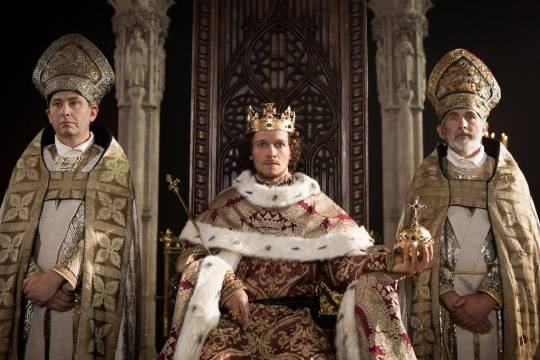
Henry VII's Coronation: The Red Dragon and the Beauforts' Triumph
On the 30th of October 1485, two months after he won the battle of Bosworth, Henry Tudor, Earl of Richmond was crowned King of England, becoming the Seventh of that name by the grace of God and all his saints.
The best description of Henry VII’s coronation and unlikely rise can be found in House of Beaufort by Nathen Amin, head of The Henry Tudor Society. Nathen Amin has done a good job reinvigorating interest in Henry VII’s reign by starting off the book with his coronation and from there moving on to the Beauforts. Henry’s maternal family, who were at the heart of every major conflict of the fifteenth century, including the wars of the roses.
“St. Edward’s Crown, resplendent in all its golden glory, was being held above the brown-haired head of a slender twenty-eight-year-old who had, until two months earlier, been a stranger to the country he was no invited to rule. The small blue eyes of this new king of England were focused, his mind resolute that this very day was the will of God. Many in the kingdom, not just the man now occupying the throne, interpreted the victory of his disparate army on a bloody battlefield under the Leicestershire sun as divine judgment. In his left hand he held a golden scepter topped with a cross, while in his right hand he clutched another scepter, mounted with a dove. The former represented his new temporal power while the latter symbolized a monarch’s spiritual authority, both of which were now vested in the royal person of Henry Tudor.
The venerated, if aged hands that held the crown belonged to Cardinal Thomas Bourchier, archbishop of Canterbury and a clergyman who had witnessed the turmoil and tragedy of the previous forty years at close quarters. Due to the cardinal’s growing infirmity, he was ably assisted during the ceremony by Peter Courtenay and John Morton, bishops of Exeter and Ely respectively, and men who had spent considerable time with Henry in exile, establishing close relations with the man they now sought to serve. As the elderly archbishop lowered the crown onto Henry’s head, he was symbolically bestowing kingship upon no fewer than his third English sovereign; Bourchier had crowned Edward IV in 1461 and Richard III in 1483, as well as crowning Edward’s wife Elizabeth Wydeville as queen in 1465. The name of Henry Tudor was now added to that prestigious list.
As would become the standard for Tudor public ceremony over the next century, no expense was spared on the opulent occasion. There was good reason for this; Henry VII had been an unknown stranger to his new subjects before the Battle of Bosworth, and he was keen to ensure he converted any doubters with lavish festivities to mark his accession. From day one, the Tudors readily acknowledged the need to put on majestic displays to conceal any flaws in their claim to the throne. It is unsurprising to later read the king’s court historian Bernard Andre describe the occasion as a ‘most excellent coronation’. The Tudors had arrived.
Throughout the day, the king appeared glorious in the new garments procured for the ancient rituals. Significant sums of money had been spent on items such as a velvet jacket with black and ermine furs, while during the day he proudly bore a surcoat crafted from fine blue cloth. Henry augmented his regal costume with a long gown of crimson cloth of gold and also had robes fashioned from crimson velvet and satin. A luxurious doublet of cloth of gold, as well as another doublet of black satin, had also been tailored for the king, who cut a glittering figure in front of his curious subjects. London’s goldsmiths, embroiderers and cloth merchants had clearly done brisk business in the weeks preceding the coronation.
Apart from the king, the coronation of Henry VII represented the triumph of several other individuals among his affinity. Many had recently been granted estates and titles from an appreciative Henry, and the ceremony was as much their celebration as it was the king’s. Henry’s devoted and resilient uncle Jasper Tudor was one such figure, having been rewarded for rescuing his brother’s son from the Yorkists at the age of fourteen and fleeing to Brittany, then France, where the pair remained until only three weeks before Bosworth. It was Jasper who was given the fitting honour of bearing his nephew’s crown through the abbey, while others given prominent roles included Thomas Stanley, recently created earl of Derby and stepfather of the king, and John de Vere, 13th Earl of Oxford, a skilled commander who had been integral in securing victory at Bosworth. Derby entrusted with bearing the Sword of State during the procession while Oxford was granted the honour of bearing the king’s train.
Throughout the ceremony, the loud lamentations of an anguished woman threatened to disrupt the solemn proceedings. The tearful lady in question was the king’s beloved mother Lady Margaret Beaufort, Stanley’s wife and widow of Henry’s father Edmund Tudor, earl of Richmond. It was apparent the countess had become stricken with fear for her only child, perhaps anticipating a series of threats to his person once settled upon the throne. During the funeral sermon given by Bishop John Fisher after Margaret’s death in 1509, her behavior during the coronation was recalled, with Fisher noting how she would ‘dredde the adversyte’ and that when ‘the Kynge her Son was Crowned, in all that grete tryumphe and glory, she wept mervaylously’. Margaret;s reaction seems extraordinary when one considers the monetous occasion, particularly as her son’s accession would bring her unparalleled influence, wealth and political sway as the king’s mother. What had prompted such a tearful outpouring of dread?
For Margaret, her only child’s coronation represented not only the unlikely triumph of the Welsh-born Tudors, but also that of her own ancestors, the Beauforts. The family traced their origin to 1372 and the birth of Margaret’s grandfather John Beaufort, an illegitimate son of John of Gaunt, the exceptionally wealthy duke of Lancaster and the third son of Edward III.
The Beauforts were, therefore, royally descended, and after their retrospective legitimization in 1397 became loyal adherents to the first three Lancastrian monarchs, amassing considerable influence in the process. By 1471, however, it was Margaret alone who survived as the last living male-line member of her family, a status she wore with brazen pride, a sentiment similarly borne by her only son. It was, after all, Beaufort blood that gave Henry his slender claim to the throne.
On the day of Henry’s coronation, several royal and dynastic emblems were liberally displayed on banners and tapestries throughout London, including generic insignia such as the English coat of arms and the badges of Saints Edmund the Martyr and Edward the Confessor. The new king had been particularly keen to draw attention to three of his own adopted emblems. The first was the red rose, which the king embraced to signify his kinship to the House of Lancaster and his uncle Henry VI, his father’s half-brother. The second was a red dragon, an ancient symbol purportedly borne by the seventh-century Welsh king Cadwaladr, from whom the Tudors claimed descent. The third symbol freely employed by the new king was that of a porticullis. In an era when heraldry was as recognizable as big brands are in the present day, those assembled in the abbey were acutely aware to whom the king was alluding, for the portcullis was an established Beaufort emblem synonymous with the family’s earlier members, including Henry’s grandfather and great-grandfather, both named John. The king would later use the motto altera securitas with the portcullis badge, stressing that his Beaufort ancestry only served to bolster his claim to a throne he had boldly claimed by right of conquest. If anyone at the coronation celebrations remained in doubt as to the king’s pride in his maternal lineage, the substantial figure of 50 pounds was spent commissioning 105 silver and gilt portcullises for distribution during the day. The purpose of this costly exercise was clear: to advertise the throne now belonged to the Beauforts, if not in name, then certainly in spirit.
The improbable rise of Henry Tudor from penniless Welsh exile to king of England is one of the most remarkable episodes in British history, but the role played by his maternal Beaufort relations in the rise is often overlooked. The Beauforts had been born as bastards to a royal duke and his foreign-born mistress to become earls, dukes and cardinals, securing untold wealth and influence throughout the first half of the fifteenth century before losing everything in a series of catastrophic battles between 1455 and 1471. It was the gradual collapse of this mighty family during the Wars of the Roses that paved the way for Henry Tudor to take up the Beaufort cause in lieu of his mother. The Tudor triumph represented the resurgence of the Beauforts.
And yet, in the momentous setting of Westminster Abbey and amidst the unbridled merriment of those present, Margaret Beaufort ‘ryghte tenderly’ wept. Though her beloved son, who ‘from a grave and serious child, had become a gallant and victorious Prince’, now occupied the throne, the tribulations of her family had preconditioned the countess to presume that soaring highs were inevitably followed by crushing lows. As Bishop Fisher summarized at her funeral, ‘whereyn she had full grete joy, she let not to saye that some dversyte wolde followe’.
When one considers the Beauforts’ tumultuous existence throughout the fifteenth century, Margaret’s attitude is perhaps easily understood. Geoffrey Chaucer, a kinsman of the earlier Beauforts through marriage, captured such anxiety perfectly in ‘The Monk’s Tale’ when he wrote,
‘And thus does Fortune’s wheel turn treacherously,
and out of happiness bring men to sorrow.’
From happiness to sorrow; it could almost have been a Beaufort family motto.” ~Nathen Amin, House of Beaufort
It’s deeply evocative. It reads more like a novel than a history book. This is what narrative history is all about. It reignites interest in these historical figures and encourages those who are new to the Tudor Dynasty, to find out more about it.
Additionally, there is something appealing about the Tudors that surpasses interest in any other dynasty. And that is thanks in part to the Tudor wit. The Tudors, more than any other monarch, learned that true power of the pen, proving once again that the pen is mightier than the sword.
Appearance were everything for them. Henry Tudor crafted an alternative tale of the events that led to the wars of the roses with the 'Tudor rose'. White over red, or red over white, it showed the union of two houses which had previously been at war with each other. This dynastic warfare had torn the country apart and it came at an end with Henry's reign and his marriage to Elizabeth of York. But as Dr. Lucy Worsley pointed out in the first episode of her documentary series Britain's Biggest Fibs, the truth was far more complicated than that.
“Henry VII’s marriage to Elizabeth would stir attention away from this …” Dr. Lucy Worsley explains, pointing to the the roll that describes the lineage of Lancastrian and Yorkist Kings, and their ancestors, the Plantagenets as well as the Anglo-Saxon kings and queens before them. The scroll belonged to the de la Pole family who had Yorkist blood via one of Edward IV’s sisters. For obvious reasons they didn’t like Henry and were in cohort with Margaret of York, Duchess Dowager of Burgundy and others, to depose Henry VII. Henry VII did descend from a “servant grandfather” as Dr. Worsley put it, but he did have Lancastrian blood via his mother, Margaret Beaufort. The Beauforts got their last name after one of the castles that belonged to their forefather, John of Gaunt, 1st Duke of Lancaster. Because the Beauforts had been conceived and born before John of Gaunt married their mother, they were considered illegitimate. But they were legitimized by Richard II. After Richard II was deposed however, their half-brother, Henry IV (the first Lancaster monarch) added another clause that excluded them from the line of succession.
Henry VII's union did not end the wars of the roses nor did it lend credibility to his claim.
Dan Jones also points this out in his book "Wars of the Roses: The Fall of Plantagenets and the Rise of the Tudors" (Hollow Crown in the UK). The war would go on well into the reign of Henry VIII, and the paranoia over those with (arguably) better claim than the Tudors, would lead to one of the most horrific executions in English history.
Nevertheless, the rise of the Tudors is nothing short of astounding. The fact that ALL of them managed to defeat all of their rivals, and remain on the throne is worthy of recognition.
In his book Rise of the Tudors (Bosworth in the UK), Chris Skidmore points out how unlikely Henry's rise was, and how it often gets overlooked by modern audiences:
“The reality of Henry Tudor’s ascent to the throne –his narrow escapes from death, his failures and anxieties, complete with constant uncertainty of his situation, and the compromises that he had been forced to make, including the support from France and hiss former Yorkist enemies in gaining the crown- was a far less welcome tale. It remains nonetheless nonetheless just as remarkable; against all the odds, at Bosworth Henry achieved victory that he should have not on”
One of the reasons that Henry VII doesn't get a lot of recognition is because the pendulum has swung to the other side, juxtaposing him in the role that was once cast for Richard. It has become fashionable to see Richard as the hero and Henry as the villain. And while it is great that many novelists and historians have taken a deep interest in the last Plantagenet king, they don't quite get that by painting both of these figures with a broad brush, they are doing the exact same thing that they accuse dozens of chroniclers and the celebrated playwright William Shakespeare of doing.
They say that those who don't learn from history are doomed to repeat it. Clearly, Henry did learn from history because he continued with many of the policies that worked during the Yorkist regime, primarily those of his late father-in-law, Edward IV, and did away with those that didn't, making him one of the best administrator and successful monarchs of the fifteenth century to the beginning of the sixteenth century.
At the time that Henry was crowned King of England, there was a lot of uncertainty. The country had lived through many uprisings. Margaret Beaufort herself shared their sentiment when she cried, according to her confessor John Fisher, tears of fear and joy upon seeing her son crowned. She, more than everyone, knew how fickle power was and if her son didn't reign properly, then he would meet the same fate as his predecessor. Time however, proved everyone wrong. Henry died on the 21st of April 1509, after ruling England for nearly twenty four years. He left the crown richer than it had ever been. He was outlived by his mother for a few months who, despite her ill-health and melancholy, refused to die until her grandson was of age and jointly crowned king of England with Katharine of Aragon as his queen.
Henry was buried at Westminster Abbey, in the lady chapel, next to his wife, Elizabeth of York.
His story has been the source of inspiration for fantasy writer George R. R. Martin, who based one of his characters on him. If this wasn't evident before, it has become evident now with the last two seasons of the show which have gone beyond the books. Daenerys Targaryen's banner is a three-headed red dragon who is regarded as a foreigner by many of her would-be-subjects. She lands on the place of her birth, a place that is regarded as mysterious as it is dreary. This is awfully familiar to Henry's return from exile when he landed on the place of his birth, Wales, on Milford Haven, on August 1485. And like Henry VII, she had the odds stacked against her. Unlike her however, he got to sit on the English throne and reigned for nearly twenty-four years, restoring stability to the kingdom and establishing a dynasty whose members were never deposed or dethroned and died in their beds.
Unsurprisingly, Martin has also been inspired by his maternal family story. For those of you who have read the books, you probably know where I am going with this but those of you who don't, let me explain. In his recent book, "The World of Ice and Fire", co-written with Antonson and Garcia, there is a separate branch of the Targaryens known as the "Blackfyres". Their last name is taken from the legendary sword of their founder, Aegon Targaryen, better known as "the Conqueror". They are a bastard line that was nearly legitimized by Aegon IV. After they launched an open rebellion against their legitimate cousins, they were wiped out with only the female members of their line surviving. And while they are not prominent on the show, they play a major role on the books.
Once again, history is the best source of inspiration, but like JRM in The Tudors said, to get to heart of the story, you have to go back to the beginning and the story of Henry's rise doesn't begin with his birth, but with his maternal family, the Beauforts.
#Henry VII#influences in pop culture#history#relation to the world of ice and fire#of george rr martin#targaryen#fantasy#dailytudors
2 notes
·
View notes
Text
United Souls and Unity Bookings Updates during Israel's War...
United Souls – Extracts from New Book Section 1 – by Eli Goldsmith – Part 42 – Pesach & Don’t #Passover – 2020-24 – Truth & Completion!
Dedicated to the real lonely Souls, soldiers & defenders of Yisrael… & Souls Globally – the United Souls that know The Truth of their Souls & for all those that know not yet. A Healthy Spring all 🙂 – With Pesach and Sefirah days already on the way……

View On WordPress
#Adar#Alex Clare#Aliya#Ari Lesser#Artists#Assaf Harush#Baal Shem Tov#Bar Mitzvah#Bless#Blessing#Book Now#Bookings#Comedians#Connect#Dj Ahava#DJ Hudacris#Dj Keyton#Dj Nayz#DJMikey Mocton#Duvie Shapiro#Eitan Katz#Ekev#Eli Goldsmith#Eli Leibovic#Emuna#Emuna Tour#Emunah#Events#Faith#Family
0 notes
Text
Books on my shelf I have yet to read: Nonfiction
A Gift of Music by Betty Carlson and Jane S Smith
Aspects of Wagner by Bryan Magee
Beethoven by William Kinderman
Chanting by Robert Gass
Classic and Romantic Music by Friedrich Blume
Folk and Traditional Music of the Western Continents by Bruno Nettl
Gregorian Chant by Will Apel
History of Music by John Russell
If It Ain’t Baroque by David W. Barber
Leonard Bernstein by Humphrey Burton
Ludwig van Beethoven ed. by Joseph Schmidt-Görg and Hans Schmidt
Music A Living Language by Tom Manoff
Music, The Brain, and Ecstasy by Robert Jourdain
Musics of Many Cultures by Elizabeth May
Night Music by Theodore Adorno
Talking of Music by Neville Cardus
The Age of Mozart and Beethoven by Giorgio Pestelli
The Inextinguishable Symphony by Martin Goldsmith
The Music Lover’s Handbook ed. by Elie Sigmeister
The Music Within You by Shelley Katsh and Carol Merle-Fishman
To The Stars by George Takei
What Makes Music Work by Allan B. Novick, Paul Harmon, and Philip C. Seyer
What to Listen for In Music by Aaron Copand
Who’s Afraid of Classical Music by Michael Walsh
1 note
·
View note
Text
I've started to write a couple of posts about more substantive things in the Robins/James radio show I've been listening to, posts that talk about the actual quality of the content and the comedy, but I can't think of how to say what I want to in those, so in the mean time, I'd like to instead make a post about this thing John Robins tends to do that keeps me awake at night. It's not important or relevant to the comedy, really. But it does stick in my brain and I'd like to get rid of it, please.
Okay, a big part of John Robins' "thing" as a comedian is talking candidly about shame and regret and generally feeling like an idiot, in ways that range from lighthearted to harrowing. He can be very relatable in talking about feeling ridiculous amounts of guilt over things that objectively weren't all that bad, but you look back at yourself after and wonder what the fuck you were thinking, especially if you happen to be a person who finds things scary when you're sober but who also likes to get drunk a lot and when you're drunk these things seem less scary (and by "these things" I don't mean, like, drunk driving, I mean like talking to someone you don't know well) and then you get sober and look at what you did and absolutely hate yourself for it. The previous sentence would have worked fine if written in the first or the third person so I split the difference and went with second, it's fine, I'm not projecting too hard on to someone's comedy material or anything.
So John Robins can get harrowingly relatable in stories like that, carefully written ones woven into his polished award-winning stand-up hours, and that's great. But every once in a while, on his radio show, he'll drop in a story on the subject that hasn't been carefully polished or planned, it's not stand-up material, it's just sort of casually mentioned and somehow the casual nature of telling it makes it even worse. Forget Peep Show or The Office or Partridge or whatever other cringe comedy is out there - I have never cringed so fucking hard in second-hand horror as when John Robins drops some little story of a time he got drunk and talked too much and too sincerely about something that's way too emotionally important to him to someone whose response is anywhere from vaguely baffled to actively put off by his enthusiasm.
I mean, the first one was rough, but Jesus Christ, that second story. How the fuck do you sleep at night? If I did that I'd never sleep again, it would keep me awake every day forever. At least now, while I am lying awake at night feeling like an idiot for every time I have expressed too much of my disproportionate enthusiasm to people, I can tell myself, at least I didn't email it to any comedians I'm a fan of (I mean I mostly haven't, one time I said something to Mark Watson in a Twitter message when he'd solicited Twitter messages about his mailing address, and I used Twitter for the first time ever to send the requisite mailing address information but I also used the opportunity to add a couple of sentences about how amazing a comedian I thought he was right from the beginning of his career, I then could not look at the website Twitter or at myself in the mirror for about a year, there's also the time I met Josie Long and the time I met Grace Petrie and both times I was genuinely incoherent, but so incoherent that it almost worked in my favour, I probably said something embarrassing but luckily I don't think I of them understood most of what I was saying, aside from getting that I was very excited to meet them, oh also there was the time I emailed Stuart Goldsmith and then I couldn't listen to the Comedian's Comedian podcast for months because it would remind me of what I'd done).
And they're little things, mostly, the stories in those Robins clips. Not as important as the ones that become his stand-up stories. More everyday, but that might be what makes them worse, the way horror hits harder if you can inject it into the mundane. Jesus. We all do this, right? Try to keep a lid on how disproportionately deeply things emotionally affect us and hate ourselves for it every time we lift that lid, especially if there was alcohol involved? Relatable comedy. Comedy-horror.
4 notes
·
View notes
Text
Lucian Freud
Lucian Freud (Berlín, 1922 – Londres, 2011) es un pintor considerado uno de los máximos representantes de la corriente figurativa británica de la segunda mitad del siglo XX que ha dado en llamarse la Escuela de Londres.
En sus retratos, centrados principalmente en las personas de su entorno próximo, Freud consigue desvelar la vulnerabilidad del cuerpo humano a través de la carnalidad matérica que rezuman sus obras.
Hijo de un arquitecto y nieto del creador del psicoanálisis, Sigmund Freud, Lucian Freud pasó su infancia en Berlín hasta que, tras la llegada de Hitler, su
familia se vio obligada a emigrar a Inglaterra.
Desde niño tuvo claro que quería ser artista. Estudió en la Dedham School of Arts and Crafts y posteriormente en el Goldsmith’s College de Londres. Su formación en el clima intelectual existencialista de la Europa de entreguerras le llevó a utilizar su pintura como instrumento de reflexión sobre la enajenación del hombre contemporáneo.
Desde los comienzos de su carrera como pintor, sus obras han tenido siempre como tema central la figura humana representada con una intensidad psicológica muy acusada. En la década de 1950, el estilo un tanto rígido de sus primeras obras dio paso a un lenguaje más suelto, de pincelada más gruesa, más informal. Esta evolución no supuso el inicio de un método de trabajo más rápido, ya que Freud siempre ha sido un pintor de ejecución lenta y meditada, que necesita alcanzar una relación de intimidad con las personas o los objetos representados. Freud valora ante todo el estudio psicológico, que une a un realismo crudo y a unas actitudes desinhibidas que en ocasiones se acercan a lo sórdido. En sus retratos no busca el parecido, sino el reflejo de lo que representan sus personajes, e intenta encontrar la esencia de su personalidad.
Entre 1958 y 1968 expuso con asiduidad en la Marlborough Gallery y desde los años setenta se han celebrado numerosas muestras internacionales de su obra que le han convertido en una de las grandes figuras del arte actual.
El uso de animales en sus composiciones está muy extendido y es a menudo característico que aparezcan las mascotas al lado de su propietario. Ejemplos de retratos de animales y personas en la obra de Freud incluyen Muchacho y Speck (1980-81), Eli y David (2005-06) y Doble retrato (1985-86).


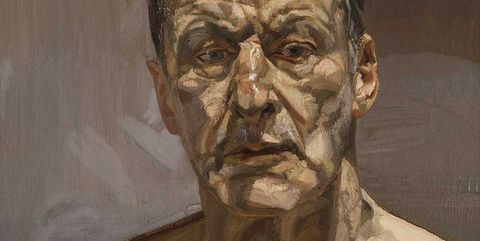

#lucian#freud#pintura#pintor#1922#20#school of london#berlin#alemania#london#londres#retrato#mascota#animal#carne#reina sofia#psicologia#goldsmiths college london
7 notes
·
View notes
Text
Lucian Freud
Lucian Freud (Berlín, 1922 – Londres, 2011) es un pintor
considerado uno de los máximos representantes de la
corriente figurativa británica de la segunda mitad del
siglo XX que ha dado en llamarse la Escuela de Londres.
En sus retratos, centrados principalmente en las
personas de su entorno próximo, Freud consigue
desvelar la vulnerabilidad del cuerpo humano a través
de la carnalidad matérica que rezuman sus obras.
Hijo de un arquitecto y nieto del creador del
psicoanálisis, Sigmund Freud, Lucian Freud pasó su
infancia en Berlín hasta que, tras la llegada de Hitler, su
familia se vio obligada a emigrar a Inglaterra.
Desde niño tuvo claro que quería ser artista. Estudió en la Dedham School of Arts and Crafts y
posteriormente en el Goldsmith’s College de Londres. Su formación en el clima intelectual
existencialista de la Europa de entreguerras le llevó a utilizar su pintura como instrumento de
reflexión sobre la enajenación del hombre contemporáneo.
Desde los comienzos de su carrera como pintor, sus obras han tenido siempre como tema
central la figura humana representada con una intensidad psicológica muy acusada. En la
década de 1950, el estilo un tanto rígido de sus primeras obras dio paso a un lenguaje más
suelto, de pincelada más gruesa, más informal. Esta evolución no supuso el inicio de un
método de trabajo más rápido, ya que Freud siempre ha sido un pintor de ejecución lenta y
meditada, que necesita alcanzar una relación de intimidad con las personas o los objetos
representados. Freud valora ante todo el estudio psicológico, que une a un realismo crudo y a
unas actitudes desinhibidas que en ocasiones se acercan a lo sórdido. En sus retratos no busca
el parecido, sino el reflejo de lo que representan sus personajes, e intenta encontrar la esencia
de su personalidad.
Entre 1958 y 1968 expuso con asiduidad en la Marlborough Gallery y desde los años setenta se
han celebrado numerosas muestras internacionales de su obra que le han convertido en una
de las grandes figuras del arte actual.
El uso de animales en sus composiciones está muy extendido y es a menudo característico que
aparezcan las mascotas al lado de su propietario. Ejemplos de retratos de animales y personas
en la obra de Freud incluyen Muchacho y Speck (1980-81), Eli y David (2005-06) y Doble
retrato (1985-86).

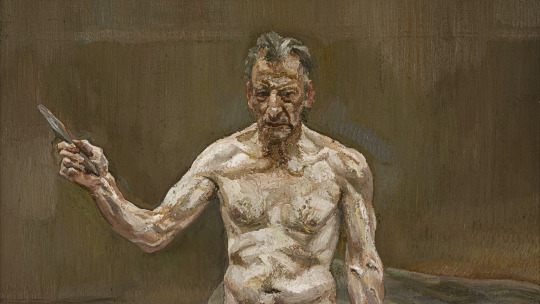
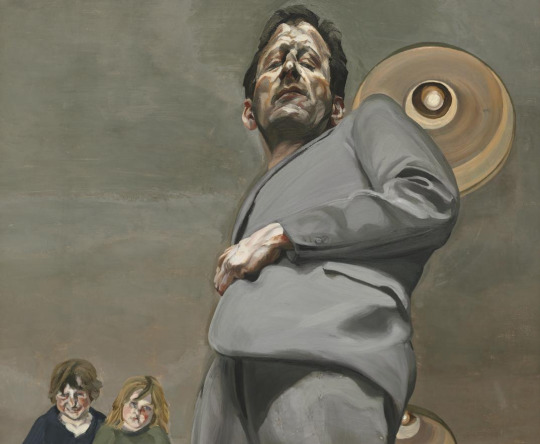
1 note
·
View note